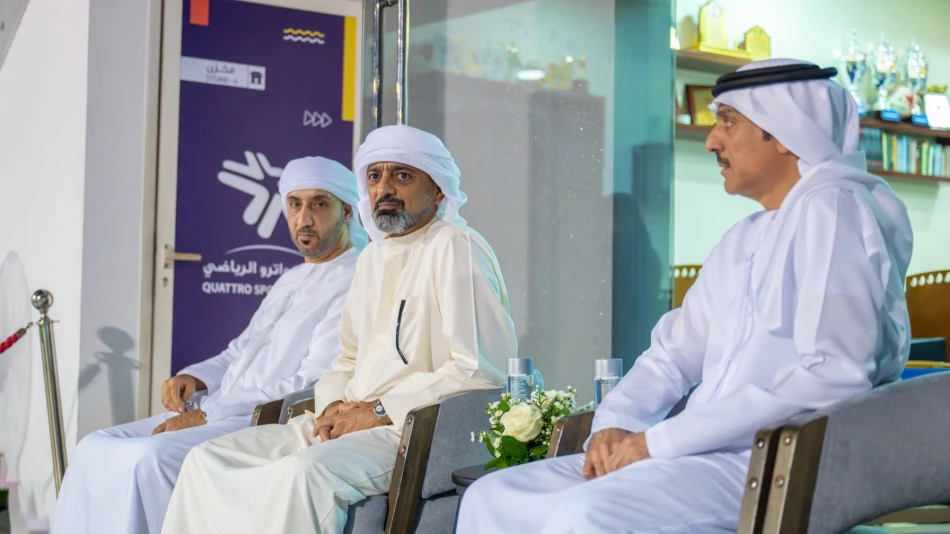
Gulf Academies Football Festival Concludes in Ajman: Ammar bin Hamid Attends Closing Ceremony
Gulf Youth Football Academies Crown Champions in Ajman's Eighth Annual Tournament
The eighth edition of the Gulf Football Academies Championship "Khaleeji Quattro" concluded in Ajman with Iraqi and UAE academies dominating the competition across three age categories. The week-long tournament, featuring 18 teams from across the Gulf Cooperation Council states, showcased the region's growing investment in youth football development and cross-border sporting cooperation.
Tournament Results Highlight Regional Football Development
The competition, held under the patronage of Sheikh Ammar bin Humaid Al Nuaimi, Crown Prince of Ajman and Chairman of the Executive Council, demonstrated the increasing sophistication of Gulf youth football programs. Iraqi Leo Academy emerged as the standout performer, claiming titles in both the 14-year and 16-year categories, while the UAE's Argentine Academy secured the 12-year championship.
Championship Finals Deliver Competitive Action
In the 12-year category, the Argentine Academy from the UAE defeated Bahrain's Oleh Academy 1-0 in a tightly contested final. Kuwait's Seventeen Four Academy claimed third place with a commanding 4-1 victory over Oman's Smart Football Academy.
The 14-year final saw Iraqi Leo Academy overcome the Argentine Academy 2-1, with Smart Football Academy securing third place through a 2-0 victory over Seventeen Four Academy. The 16-year championship featured Leo Academy's narrow 1-0 triumph over defending champions Al Jawhara from Oman, while Saudi Arabia's P1 Academy took third place with a 1-0 win over Iraq's Sawa Academy.
Strategic Significance for Gulf Football Development
Investment in Youth Infrastructure Pays Dividends
The tournament's success reflects the Gulf region's broader strategy to develop homegrown football talent amid increasing competition from European and South American academies. Unlike traditional youth tournaments that focus purely on domestic development, Khaleeji Quattro creates a regional talent pipeline that could strengthen Gulf football's international competitiveness.
Iraq's strong showing, despite the country's ongoing economic challenges, demonstrates how focused academy investment can yield results even with limited resources. This contrasts with the UAE's approach of importing foreign coaching expertise through partnerships with Argentine methodology, suggesting multiple pathways to youth development success.
Corporate Sponsorship Signals Growing Commercial Interest
The tournament attracted significant corporate backing, with sponsors including Lavish Perfumes Group as gold sponsor, Business Line Group as silver sponsor, and Al Fakhamah Travel Company as bronze sponsor. This level of commercial interest indicates that Gulf businesses view youth football as both a marketing opportunity and a social responsibility investment.
The involvement of the UAE Sports for All Federation and Al Ihsan Charitable Society as organizational partners demonstrates the integration of sports development with broader social and health initiatives, mirroring successful models in countries like Qatar and Saudi Arabia.
Regional Implications and Future Prospects
Building Tomorrow's National Teams
The individual awards revealed the depth of talent across the region, with players from Iraq, Oman, UAE, Kuwait, Bahrain, and Saudi Arabia claiming various honors. This geographic distribution suggests that no single country dominates youth development, creating healthy competition that should elevate overall standards.
The presence of Gulf football legends including UAE's Faisal Khalil, Saudi Arabia's Nasser Al Shamrani, Qatar's Ahmed Khalil, and Oman's Fawzi Bashir at the closing ceremony underscores the tournament's role in connecting current and future generations of Gulf football talent.
Long-term Strategic Value
As Gulf nations prepare for increased international football exposure—with Saudi Arabia hosting the 2034 FIFA World Cup and Qatar's continued post-2022 World Cup development—tournaments like Khaleeji Quattro become crucial for identifying and developing regional talent. The competition provides a testing ground that bridges the gap between domestic youth leagues and international competition.
The seven-day format allows for comprehensive talent evaluation while the multi-age category structure ensures continuous development pathways. This systematic approach positions the Gulf region to reduce its traditional reliance on naturalized players and foreign coaches, potentially reshaping the competitive landscape of Asian football in the coming decade.
Most Viewed News

 Sara Khaled
Sara Khaled






